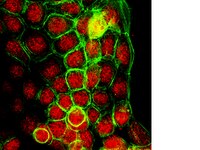Polycomb eviction as a new distant enhancer function.
Vernimmen, D; Lynch, MD; De Gobbi, M; Garrick, D; Sharpe, JA; Sloane-Stanley, JA; Smith, AJ; Higgs, DR
Genes & development
25
1583-8
2011
Show Abstract
Remote distal enhancers may be located tens or thousands of kilobases away from their promoters. How they control gene expression is still poorly understood. Here, we analyze the influence of a remote enhancer on the balance between repression (Polycomb-PcG) and activation (Trithorax-TrxG) of a developmentally regulated gene associated with a CpG island. We reveal its essential, nonredundant role in clearing the PcG complex and H3K27me3 from the CpG island. In the absence of the enhancer, the H3K27me3 demethylase (JMJD3) is not recruited to the CpG island. We propose a new role of long-range regulatory elements in removing repressive PcG complexes. | 21828268
 |
Carcinoma in situ testis displays permissive chromatin modifications similar to immature foetal germ cells.
Almstrup, K; Nielsen, JE; Mlynarska, O; Jansen, MT; Jørgensen, A; Skakkebæk, NE; Rajpert-De Meyts, E
British journal of cancer
103
1269-76
2010
Show Abstract
The majority of testicular germ cell cancers develop through a pre-invasive carcinoma in situ (CIS) stage. The CIS cell is a neoplastic counterpart of foetal germ cells. During their development, foetal germ cells undergo extensive and essential epigenetic modifications, but little is known about epigenetic patterns in CIS cells.Immunohistochemistry was used to investigate epigenetic patterns in CIS, germ cell tumours, normal adult and foetal testicular tissue.CIS cells show low levels of DNA methylation and repressive histone modifications H3K9me2 and H3K27me3, but high levels of H3K9 acetylation, H3K4 methylation and H2A.Z, which all are associated with an activated and accessible chromatin structure. Collectively this renders a permissive chromatin structure and in accordance high levels of RNA polymerase II activity and proliferation (Ki-67 and mitotic index) is observed in CIS cells. Epigenetic patterns similar to that of CIS cells were observed in human gonocytes present within sex cords in foetal testes but correspond to migrating primordial germ cell in mice. Development of overt tumours involves epigenetic repression of the chromatin.CIS cells have a permissive and foetal-like chromatin structure, which is associated with a high transcriptional and proliferative activity, likely empowering neoplastic transformation. Developmental epigenetic cues in foetal germ cells are substantially different between humans and mice. | 20823885
 |











